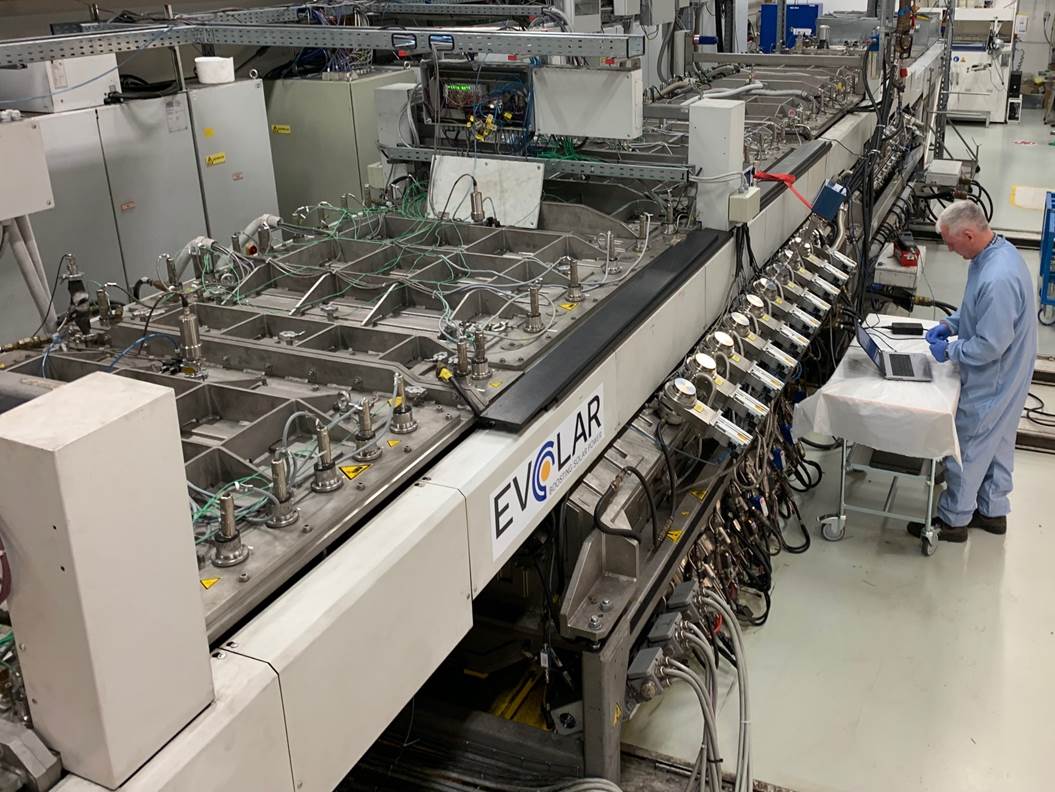Perovskite solar cells have no doubt caught the solar industry’s eye with their potential for high efficiency and low-cost, low-impact manufacturing. However, questions over long-term stability and how the materials would fare left in demanding outdoor conditions for many years continue to hang over the technology, and it will take some convincing demonstrations in both laboratory and outdoor testing to persuade investors.
Swedish startup Evolar, led by founders of now-insolvent CIGS thin-film manufacturer Solibro, is developing a turnkey production line for perovskite cells. The company said it can be added to silicon production lines as an upgrade to tandem cell production. It claimed that its “PV Power Booster” perovskite technology could increase cell energy yield by 25% at a very low cost, and noted that it will be soon be able to offer manufacturing solutions that could have customers producing perovskite cells within 18 months of signing contracts.
Now, the company is looking to make just such a convincing demonstration: This week, it announced that it has put its technology – in the form of encapsulated, semi transparent standalone perovskite modules with an active area of 100 square centimeters – through a series of industry-standard accelerated reliability tests. And the results suggest that the cells could stand up to 25 years if deployed outdoors.
Evolar CEO Mats Ljunggren told pv magazine that the cells were exposed to damp heat conditions – 85% humidity at a temperature of 85 C, for double the 1,000 hours specified in IEC testing standards (IEC 61215). While the company has not made the full test results available, Ljunggren said that they were within the margin of 5% performance loss specified in the standard.
The cells for testing were produced on Evolar’s prototype production line in Uppsala, Sweden, where it is working to scale up evaporation-based processes for perovskite layer deposition.
“The device has a P-I-N structure. All layers are deposited with industrial compatible dry processes,” said Ljunggren. “In the perovskite layer we have avoided MA (methylammonium) from our start of development for stability reasons. The module is made by monolithic interconnection by laser scribing and is encapsulated in a glass-glass laminate.”
He added that the encapsulation strategy is also key for stability, and that here Evolar is able to build on its experience with other thin-film PV technologies at Solibro to select the best materials and strategies for both encapsulation and edge sealing.
The testing was conducted internally at Evolar’s laboratories, and has not been verified by any third party. And while encouraging, it is widely acknowledged that proving long-term reliability in the field is about much more than just being able to pass certification tests. Results from accelerated testing over much longer periods, verified by results from actual outdoor testing, will be the next step for manufacturers looking to show that perovskites can meet the solar industry’s demanding performance expectations.
This content is protected by copyright and may not be reused. If you want to cooperate with us and would like to reuse some of our content, please contact: editors@pv-magazine.com.




Too early to be optimistic, especially knowing the size of these companies. If a Tier 1 manufacturer buys Evolar and puts serious research dollars into it, we might have something groundbreaking in a year or two. As always, the problem will remain QC and achieving economy of scale with the new technology.